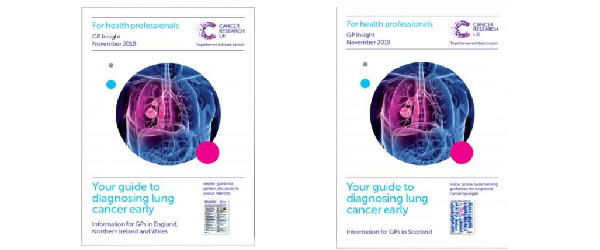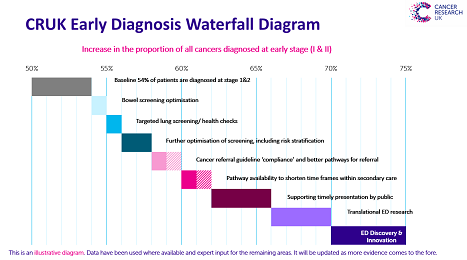| Dear Supporter, Welcome to the January 2020 Early Diagnosis newsletter, our first of the new year. This months newsletter includes a new meet the Early Diagnosis team section, as well as the latest papers published using NCDA data, bite-sized resources for healthcare professionals, an update on the 2021 CRUK Early Diagnosis Research Conference and more! We have a lot planned for the next year and we cant wait to keep you updated. Well see you next time and thank you for reading. Best wishes, Dr Jodie Moffat and the Early Diagnosis team Cancer Research UK |
|
|---|
|
|---|
|
|
2021 Cancer Research UK Biennial Early Diagnosis Research Conference Over 300 healthcare professionals, researchers, academics, patients, and industry experts attended the fifth biennial early diagnosis research conference in 2019. It was a fantastic 10 year anniversary conference but in case you missed it, our highlights reportincludes all you need to know from the 3-days. The planning for the next conference taking place in early 2021, is already underway. Watch out for a save the date in our next newsletter, or if you would like to sign up to receive a separate save the date then please let us know at [email protected]. Were also going to be keeping our conference web pages up to date with the latest info. |
|
|---|
|
|---|
|
|
NCDA Articles The National Cancer Diagnosis Audit (NCDA) is a UK-wide project seeking to better understand patient pathways to cancer diagnosis through primary care and provide data that can underpin quality improvement. In 2017, over 400 GP practices in England contributed data to the NCDA, providing researchers with a dataset of over 17,000 diagnosis pathways to study, covering patients diagnosed in 2014. In the last month, two separate analyses of NCDA data from this first round of the audit have been published in the Lancet Oncology and Cancer Epidemiology. Dr Monica Koo and colleagues looked at the links between common symptoms patients present with, and how these relate to cancer stage at diagnosis. They found that most symptoms werent indicative of a specific cancer stage, providing support for interventions that highlight common cancer symptoms and encourage patients to present. Dr Ruth Swann and colleagues focused on GP-reported avoidable delays in pathways to diagnosis. For around one quarter of patients the GP felt that, with hindsight, an avoidable delay had occurred somewhere along the pathway. The researchers found that long waiting times for tests were responsible for a quarter of all avoidable delays reported across GP surgeries and hospitals, highlighting the urgent need to address the NHS workforce crisis, particularly in terms of diagnostic workforce. The second round of the NCDA is currently collecting data across England, Scotland and Wales, and GP practices interested in the project can still take part. In the meantime, the 2014 data is available if youre interested in exploring research questions with it. |
|
|---|
|
|---|
|
|
Free resources for Healthcare Professionals! Are you a healthcare professional looking for some bite-sized resources? We have a great selection of videos and podcasts to quizzes and modules worth CPD credits, all covering a variety of topics including early diagnosis. |
|
|---|
|
|---|
|
|
 |
A busy Lung Cancer Awareness Month! November was Lung Cancer Awareness Month, and here are some highlights. CRUK produced a Cancer Insight Newsletter in collaboration with Dr Stephen Bradley GP, Clinical Researcher Fellow at University of Leeds and member of CanTest to help GPs be alert to lung cancer and to diagnose it early. Order one now if you missed it: Cancer Insight (England & Wales) & Cancer Insight (Scotland) And in the RCGP clinical news, Dr Richard Roope, CRUK Clinical Lead for Cancer spoke about How GPs can contribute to earlier diagnosis of lung cancer? Following closely behind was the publication of Dr Samantha Quaifes latest paper on the Lung Screen Uptake Trial (LSUT). The study aimed to explore ways to support good uptake of lung cancer screening and reduce inequalities in those taking part using behavioural science. Across both trial arms there was very encouraging uptake of 52%, as well as a reduced social gradient for participation in the intervention arm. These findings are timely considering the launch of NHSE's targeted lung health check programme. |
|
|---|
|
|---|
|
|
Detecting Cancer Early Blog Series Throughout November and December, CRUK did a series of blogs on detecting cancer earlier which centred around diagnostic tests, and specifically the potential in testing blood, poo and urine. You can catch up on the blogs below. |
|
|---|
|
|---|
|
|
Ca-PRI 2020 Oxford Registration open The Cancer and Primary Care Research International Network (Ca-PRI) is an open, multidisciplinary network for researchers in primary cancer care and related areas. Ca-PRI promotes greater international collaboration in primary care and cancer research primarily by supporting networking and arranging a yearly conference with the focus on the role of primary care throughout the cancer journey from prevention to palliative care. For more information please visit the Ca-PRI website. The next conference is on 1 3 April 2020 at St Hughs College, Oxford, and early bird registration is still open until the 14 February. |
|
|---|
|
|---|
|
|
Shaping the Future of Cancer Care have your say! Were doing a piece of futures work to understand the biggest medium-long term opportunities and challenges for UK health systems and services. We want to collaborate more widely and creatively to develop our thinking. This complements our expertise in evidence-based solutions for existing/near-future problems. Please fill out our survey which closes at the end of February, to help us understand:
What major barriers will stop health systems from preventing and curing more cancers, and giving people more time with their families?
How can the NHS provide the best environment for conducting research?
What are the opportunities on the horizon which we will need to embrace? Understanding these opportunities and challenges will enable us to have more transformative conversations and provide a stronger platform for our health services to adapt to become fit for the future. It will help us accelerate progress. If youd prefer to send us some top-line thoughts about the main opportunities and challenges facing UK health systems and services, please email your responses to [email protected] |
|
|---|
|
|---|
|
|
 |
How do we achieve stage shift for earlier diagnosis? Were fortunate that theres a lot of interest in improving cancer outcomes through moving patients from a late stage diagnosis to an earlier or early one. But the challenge is knowing what exactly is needed in order to achieve this. What is clear is that there is no one thing achieving early diagnosis is a complex problem that needs to be tackled on a range of fronts at all levels of the system. Its also not something we can solve purely on the basis of what is known we need action and research if we are to make a real, significant difference and achieve our ambitious ambitions. This is fundamental to CRUKs approach to Early Detection and Diagnosis. The CRUK Early Diagnosis Waterfall diagram has been developed to help articulate the things we think will help to reduce the burden of late stage cancer. Its built on data where possible such as estimates of the impact of different screening interventions and expert input where it is not. It reinforces that no one thing will achieve the stage shift we seek; we need coordinated action on a range of fronts and at all levels to make the difference. Weve found our waterfall to be a useful conversation starter, and an excellent prompt for further questions and discussions. We will be keeping it up to date as more evidence arises and are keen to continue to be as responsive as we can to suggestions for how it can be improved and built upon. If youve got any comments or questions email the team at [email protected] |
|
|---|
|
|---|
|
|
Meet the Early Diagnosis Team! Name: Kathryn Whitmore
Job title: Early Diagnosis Officer (Cancer Outcomes) The Early Diagnosis (ED) team sits in the Policy and Information (P&I) Directorate at CRUK. Headed up by Jodie Moffat, it works closely with teams throughout P&I, such as Cancer Intelligence, Policy Development and the Health Professional Facilitator team, to drive evidence-based changes to early diagnosis in policy and practice. Key to this, the ED team also works closely with colleagues in the Early Detection Research team in our Research and Innovation Directorate, to support a strong research community and impactful research and implementation pipeline. Kathryn joined CRUK in 2018 and sits on the evidence side of the Early Diagnosis team as one of three Officers. The main part of her role is synthesising, analysing and collating different pieces of evidence to help work out the best ways to improve cancer outcomes by diagnosing cancer earlier and ensuring patients can access the best treatment for them. Kathryn is responsible for topics which span the entire cancer pathway including early detection, lung screening/targeted lung health checks and access to treatment which all feed in to the wider early detection and diagnosis strategy. Before joining CRUK, Kathryn completed a PhD in Clinical Neuroscience at UCL Great Ormond Street Institute of Child Health which looked at trying to understand why children with a particular disease (adenosine deaminase deficiency) often have neurological problems, which persist before and after treatment. Kathryn also recently finished a part-time secondment working with Professor Sir Mike Richards on the Independent review of Adult Screening Programmes, which was a hugely interesting and insightful experience. Kathryn managed the call for evidence and analysed all the responses, making sure the review was as comprehensive as possible by considering submissions from a number of stakeholders, as well as working closely with the CRUK Patient Involvement team to make sure the screening review considered the viewpoint of people with varying literacy levels and those affected by cancer. You can read the review findings and recommendations here. |
|
|---|
|
|---|
|
|
Diagnostics Review Professor Sir Mike Richards is following up his independent screening review (mentioned above) with a diagnostics review. So many ED interventions rely on diagnostics capacity and were not able to go as far, or as fast, as we want to because of shortages in key workforce. Were very much looking forward to hearing Professor Richards recommendations. |
|
|---|
| Unpicking SCDI and routine referrals Last year, we were part of a project that saw Secondary Care Diagnostic Intervals (SCDI) published for the first time. These data gave valuable insight into this key part of the diagnostic process for close to 500,000 cancer patients diagnosed over a two year period. The findings showed that patients diagnosed via a routine referral had the longer SCDI, and those diagnosed via emergency presentation the shortest. Now more work is being done on this topic to find out more about the routine referral group and what might need to be done differently. Watch this space. |
|
|---|
|
|---|
|
|
|